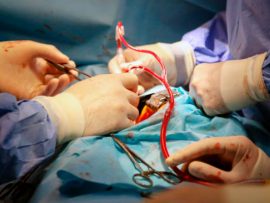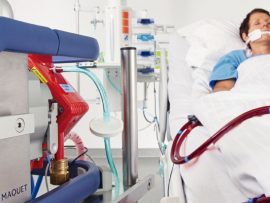Abstract Background As the burden of cardiovascular disease grows, so does the number of cardiac surgeries. Surgery is increasingly performed on older people with comorbidities who are at higher risk..
Read MoreAbstract Extracorporeal cardiopulmonary resuscitation (ECPR) is a complex, life-saving procedure that uses mechanical support for patients with refractory cardiac arrest, representing the pinnacle of extracorporeal membrane oxygenation (ECMO) applications. Effective..
Read MoreAbstract Venoarterial extracorporeal membrane oxygenation (VA-ECMO) has been utilized to treat massive pulmonary embolism (PE) accompanied by cardiac arrest or refractory cardiogenic shock. Our team opted for a femoral-femoral approach..
Read MoreAbstract Venoarterial extracorporeal membrane oxygenation (VA-ECMO) is applied for the treatment of cardiogenic shock. Concomitant left ventricular unloading (LVU) with a microaxial flow pump (mAFP) enables myocardial and pulmonary recovery..
Read MoreAbstract Introduction No clear guidelines exist for unfractionated heparin (UFH) monitoring in adult patients on veno-arterial extracorporeal life support (VA-ECLS) for refractory cardiogenic shock. In this study, we sought to..
Read MoreAbstract Veno-arterial extracorporeal membrane oxygenation (VA-ECMO) is increasingly used for the management of refractory cardiogenic shock. Although VA-ECMO can stabilize hemodynamics and improve systemic flow, morbidity, and mortality on support..
Read MoreAbstract Cardiogenic shock is a complex and diverse pathological condition characterized by reduced myocardial contractility. The goal of treatment of cardiogenic shock is to improve abnormal hemodynamics and maintain adequate..
Read MoreAbstract The use of temporary mechanical circulatory support (tMCS) in cardiogenic shock patients has increased during the last decades with most management strategies relying on observational studies and expert opinion,..
Read MoreAbstract Veno-arterial extracorporeal membrane oxygenation (VA-ECMO) is used in case of potentially reversible cardiac failure and restores systemic hemodynamics. However, whether this is followed by improvement of microcirculatory perfusion is..
Read MoreAbstract Introduction Spinal cord infarction (SCI) or ischemia is a rare but devastating complication of venoarterial extracorporeal membrane oxygenation (VA ECMO). The natural course and outcomes are poorly studied. Methods..
Read MoreAbstract Background While left ventricular (LV) venting reduces LV distension in cardiogenic shock patients on venoarterial extracorporeal membrane oxygenation (VA-ECMO), it may also amplify risk of acute brain injury (ABI). We..
Read MoreAbstract Cardiogenic shock (CS) is a highly complex clinical condition that requires a management strategy focused on early resolution of the underlying cause and the provision of circulatory support. In..
Read MoreAbstract Extracorporeal membrane oxygenation is increasingly being used to support patients with hypoxemic respiratory failure and cardiogenic shock. During the COVID-19 pandemic, consensus guidance recommended extracorporeal life support for patients..
Read MoreAbstract Background The use of Extracorporeal Membrane Oxygenation (ECMO) remains associated with high rates of complications, weaning failure and mortality which can be partly explained by a knowledge gap on..
Read MoreAbstract Introduction The mobilization and ambulation of patients with severe cardiogenic shock supported with peripheral veno-arterial extracorporeal membrane oxygenation (pVA-ECMO) and concomitant femoral intra-aortic balloon pump (IABP) support is not..
Read MoreAbstract Objective: Impella 5.5 (Abiomed, Danvers, MA, USA) is a temporary mechanical circulatory support device used for patients in cardiogenic shock. This review provides a comprehensive overview of the device’s..
Read MoreAbstract Cardiogenic shock (CS) is one of the most challenging areas in cardiology, where hard evidence is often limited. Several factors contribute to this scarcity. Patients with CS are typically..
Read MoreAbstract Summary Cardiogenic shock is a complex syndrome defined by systemic hypoperfusion and inadequate cardiac output arising from a wide array of underlying causes. Although the understanding of cardiogenic shock..
Read MoreAbstract Background: Hydroxocobalamin increases systemic blood pressure through nitric oxide pathway suppression. However, its effects on hypotension during extracorporeal membrane oxygenation (ECMO) are unknown. The objective of this study was to..
Read MoreAbstract Background: Venoarterial extracorporeal membrane oxygenation (VA-ECMO) has been increasingly used for refractory cardiogenic shock (CS). Although guidelines have downgraded the recommendations for intra-aortic balloon pump (IABP) in CS, escalation from..
Read MoreAbstract In recent decades, the use of veno-arterial extracorporeal membrane oxygenation (VA-ECMO) has increased. In acute cardiogenic shock, VA-ECMO implantation can serve as a bridging solution to facilitate recovery, provide..
Read MoreAbstract Cardiogenic shock is a critical condition that affects up to 10% of patients hospitalized with acute myocardial infarction (AMI), representing the primary cause of death in this group [, ]...
Read MoreAbstract Background: Veno-Arterial Extracorporeal membrane oxygenation (VA-ECMO) provides temporary cardiopulmonary support in the setting of refractory cardiogenic shock. Mechanical ventilation and sedation often accompanies VA-ECMO support and carry the increased risk..
Read MoreAbstract Introduction This study aimed to investigate the relationship between acquired antithrombin deficiency in patients undergoing postcardiotomy extracorporeal membrane oxygenation (PC-ECMO) and thromboembolic or haemorrhagic events such as bleeding, peripheral..
Read MoreAbstract Endothelial injury is usually considered as a major com-ponent of the systemic inflammatory response observed during veno-arterial extracorporeal membrane oxygena-tion (VA-ECMO) support. Yet, few data are avail-able to support..
Read MoreAbstract Background: Left atrial veno-arterial extracorporeal membrane oxygenation (LAVA-ECMO) is a novel mechanical cardiocirculatory support strategy that provides robust cardiocirculatory support and simultaneous left and right atrial venting via a multi-fenestrated..
Read MoreAbstract Background Central venoarterial extracorporeal membrane oxygenation (VA-ECMO) is a commonly employed strategy to support patients in refractory postcardiotomy cardiogenic shock (RPCS). This support can be provided using either indirect..
Read MoreAbstract Background Evidence supporting with unfractionated heparin (UFH) in patients with an intra-aortic balloon pump (IABP) to prevent remains limited, while bleeding risks remain high. Monitoring heparin in this setting with anti-factor..
Read MoreAbstract Purpose: Patients receiving venoarterial extracorporeal membrane oxygenation (VA‑ECMO) frequently develop arte‑rial hyperoxaemia, which may be harmful. However, lower oxygen saturation targets may also lead to harmful episodes of hypoxaemia...
Read MoreAbstract Endothelial injury is usually considered as a major com-ponent of the systemic inflammatory response observed during veno-arterial extracorporeal membrane oxygena-tion (VA-ECMO) support [1, 2]. Yet, few data are avail-able..
Read More
















